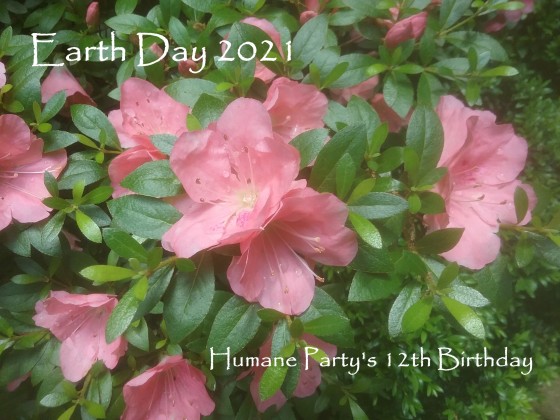Brandy Walt Steps Forward: A New Chapter for the Humane Party In a bold leap towards a future enriched with … More
Author: Ⓥ
“World Vegan Day” News: The Humane Party Endorses Brandy Walt, Visionary Beyond the Two-Party System, for U.S. President.
In a transformative moment for American politics, the Humane Party proudly endorses Brandy Walt as our candidate for the 2024 … More
“Jane Unchained” Covers U.S.’s First Vegan, Animal Rights Political Party
Jane Unchained News Network has published a new article covering the Humane Party, which emerged in 2009 as the U.S.’s … More
Victory! Humane Party Proposal Gains Unanimous Support from Democrat-Republicans in the Senate
The Humane Party‘s call for a national holiday celebrating the end of human slavery has now gained the unanimous endorsement … More
Massive surge of support bodes well as Humane Party celebrates 12th anniversary
The events of 2020-21 have engendered a massive, worldwide surge of support for Humane Party positions that had previously been … More
Abolition Academy: The “Slave State vs. Free State” Concern
The Abolition Amendment was designed to be passed and ratified at the federal level, thereby ending slavery and emancipating all animals throughout the United States of America. But with a simple modification of the text, the Abolition Amendment can also be enacted at the state level. The Humane Party expressly encourages activists to pursue abolition at the state level, even before sufficient numbers have been attained to achieve victory at the national level. However, as the Compromise of 1820 (“Missouri Compromise”) marks its 200th anniversary, it is worth examining a concern associated with the state-by-state approach.
Bernie Sanders’ Wildest Dreams Come True, Courtesy of Trump Administration
The U.S.’s ruling Democrat-Republican bloc has been propping up the failing animal-exploitation “industry” with taxpayer dollars for decades. No one has emerged as a more reliable pawn of animal exploitation than Bernie Sanders, who has built his career serving the Vermont animal-exploitation “industry.” And this week, the Trump administration announced handouts in the amount of $9.6 billion to animal-killing operations.
Coronavirus: Top U.S. and U.N. Science and Health Advisors Endorse Humane Party Position
From energy policy to economics, virtually every day another group of scientists comes out in favor of the Humane Party position. The coronavirus pandemic has only accelerated that trend.
The Abolitionists (2013), Amazing Grace (2006), and Schindler’s List (1993): Recommended Viewing
History holds a treasure trove of resources for vegan, abolitionist, animal rights activists, but many of these resources remain untapped by the movement. This omission can, one hopes, be partly remedied through articles and film dramatizations pointing to information about moments in history from which readers and viewers can extract valuable lessons, glean techniques, and draw moral support.
A Theory of Justice (John Rawls), The Evolving Self (Mihaly Csikszentmihalyi), Man’s Search for Meaning (Victor E. Frankl): Recommended Reading
Science and technology tend to progress at a faster pace than do fields such as philosophy and ethics. For reasons … More
Humane National Committee (USA): Class B seat clusters published for 30-day public-comment period
In 2018, the overall parameters for the Humane National Committee were finalized by the Humane Party after expiration of the associated public-comment period and internal review. Assignment for the seats of Class A, which takes a geography-based approach related to that used in the U.S. House of Representatives, was also finalized after public comment and review. Proposed seat clusters for Class B are today published through The Humane Herald for public comment. The public is invited to comment on these proposed seats during the next 30 days.
Milestones from the Humane Party’s first ten years
In recognition of the Humane Party’s 10th birthday, here’s a brief account of some milestones from the organization’s first decade. … More
Veggie Pride Parade Predicts Thousands For NYC Rally
Dozens of Vendors to Offer Cruelty-Free Products at April 14 Post-Parade Festival The largest annual celebration in the Tri-State area … More
Sources of the Humane Party
As the 10th anniversary (April 22) of the official launch of the Humane Party approaches, it may be beneficial to … More
Cartoon: “Welcome, Friends….”
Under the Democrat-Republican regime, animals are property. Living creatures, other than humans, can currently be bought, owned, bartered, and sold … More
Cartoon: “Unite for Animals”
The animal-exploitation industries and their political representatives place their hope in keeping the animal-protection community divided against itself. Such division … More
















